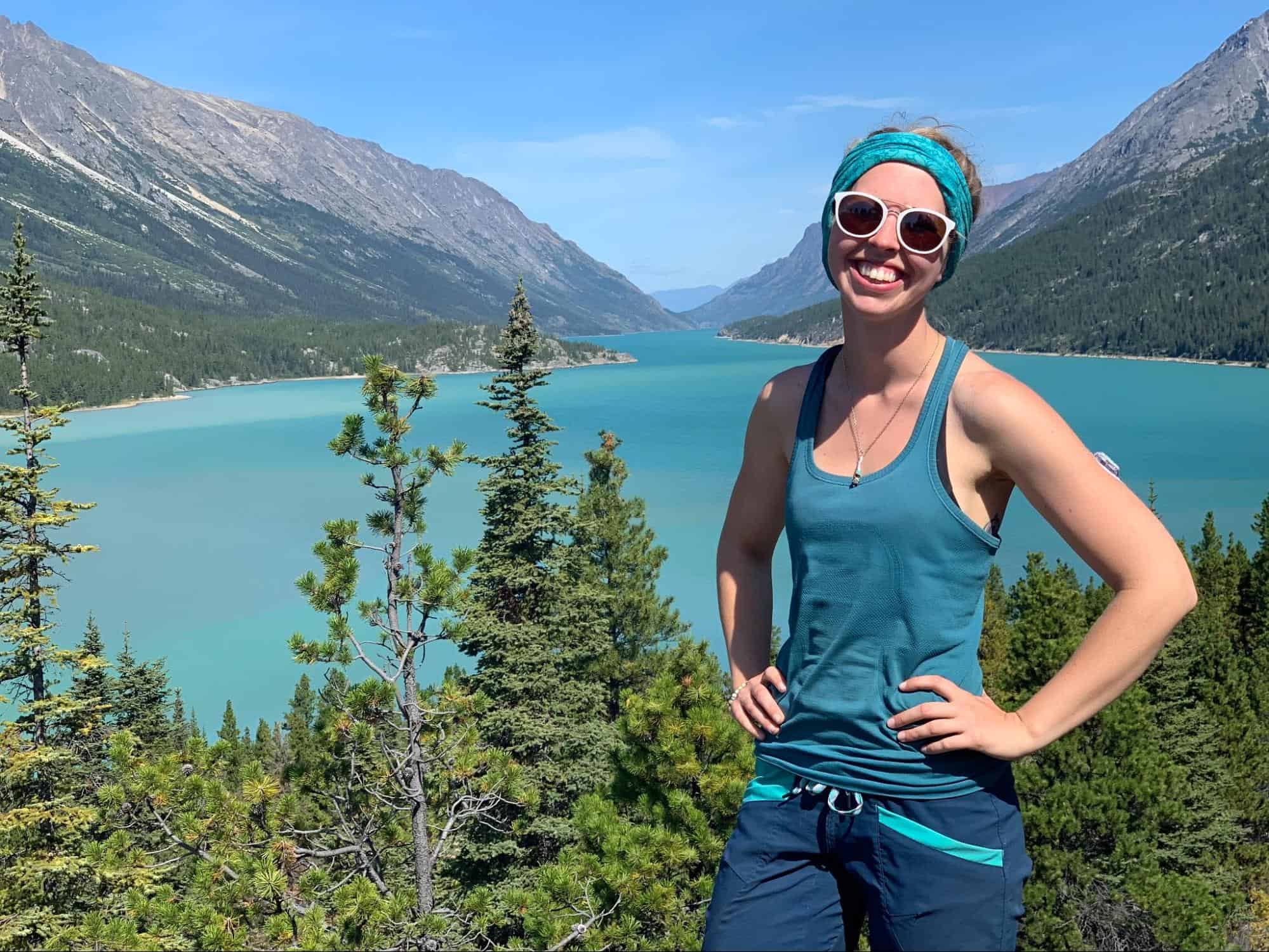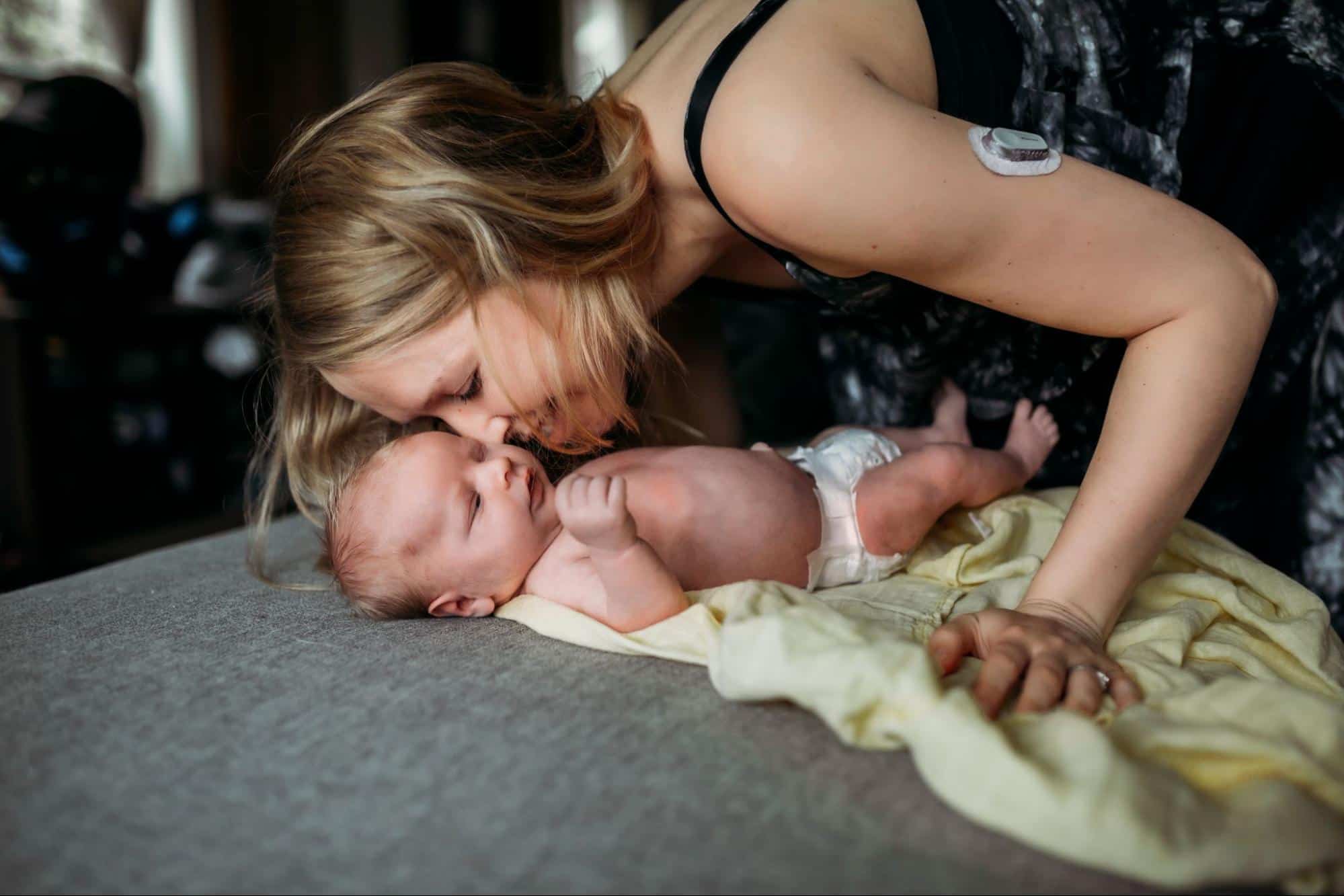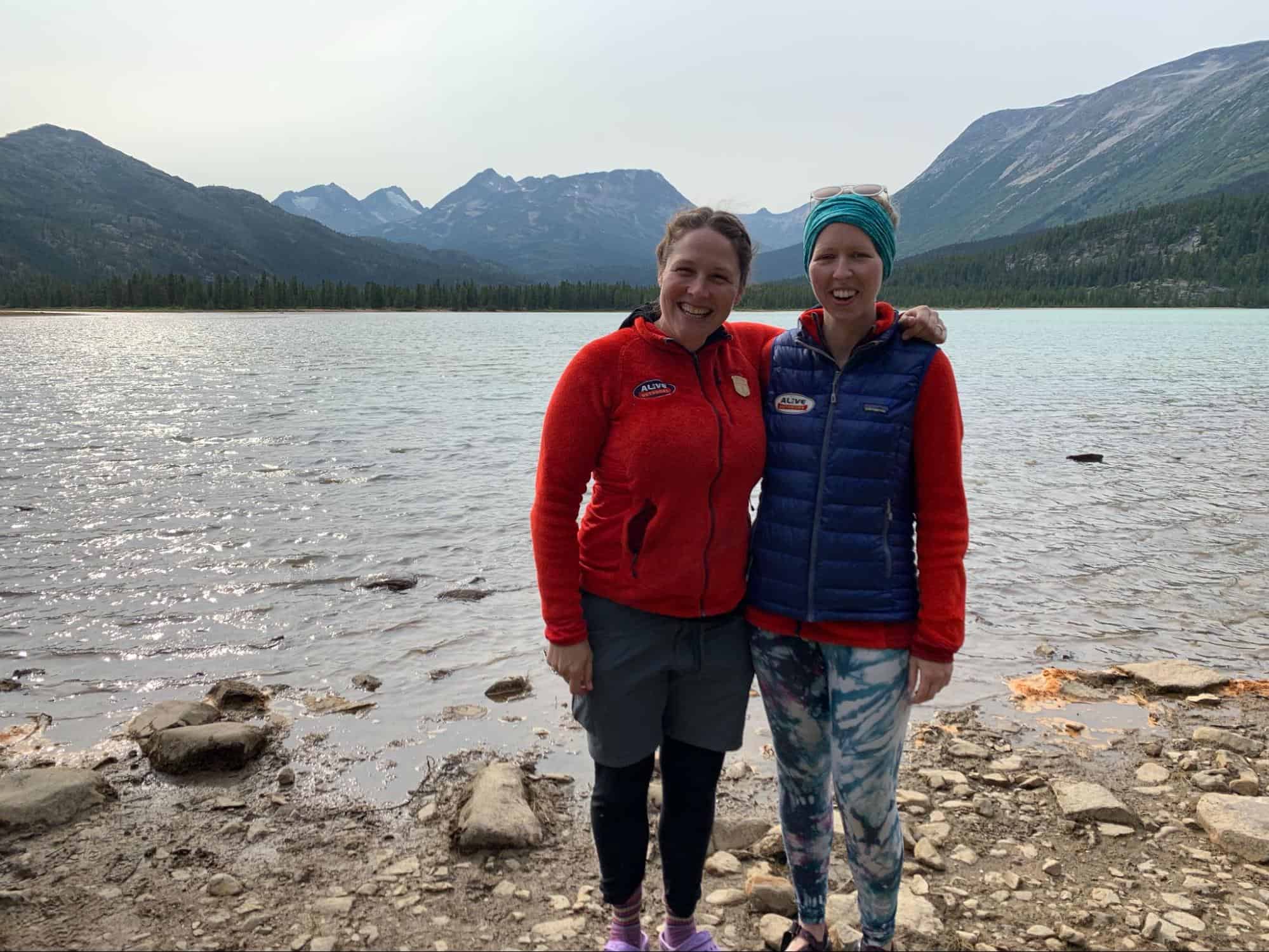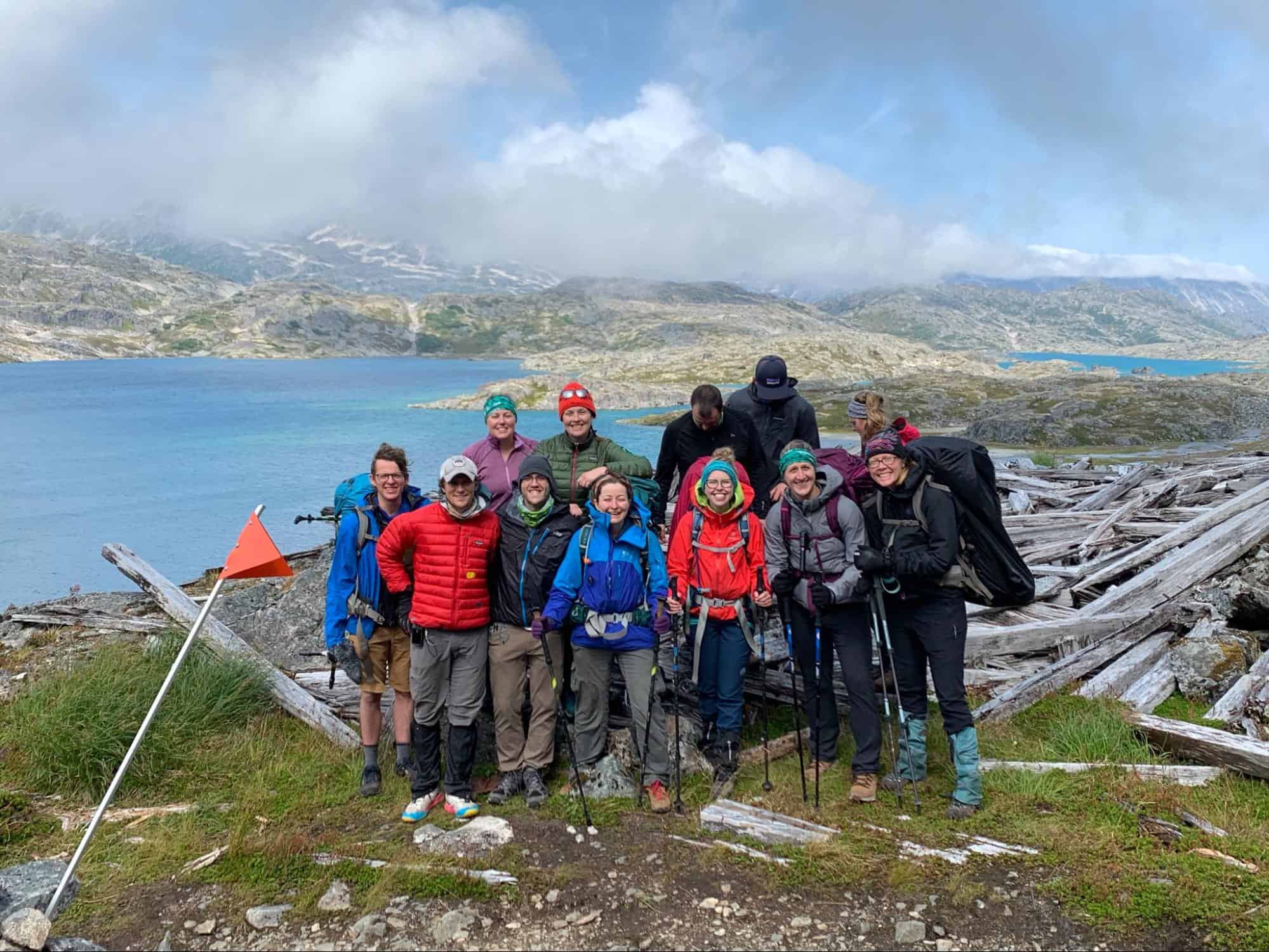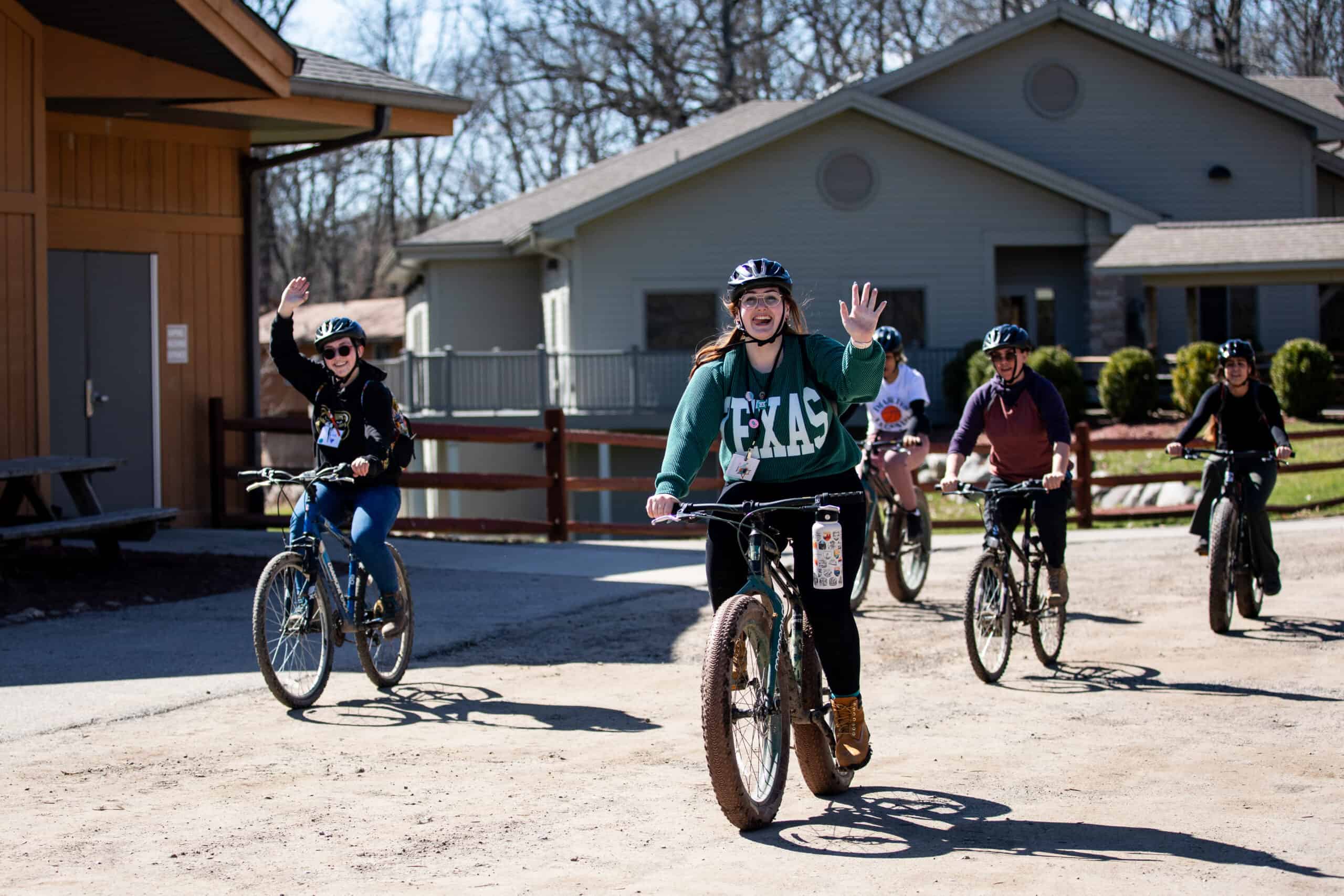This blog is part of the Living Without Limits series featuring conversations with CIM community members who engage in fun, challenging, and interesting activities and careers. This post highlights Jordi Cumber who works as labor and delivery nurse with type 1 diabetes.
Eleanor: First, could you tell me a little bit about your diabetes story?
Jordi: I was diagnosed in 2001, so 2021 was my 20th anniversary of having diabetes. I was diagnosed on Valentine’s Day! I attended Camp Huronda as a pre-teen and worked there as a Nurse’s Aide during University. I was pretty anti-technology until about 3 years ago, for no reason other than I did not have a ton of information and wasn’t really involved in the community. I had some significant diabetes burnout associated with other chronic illnesses that I had going on, and that’s what led me to a Connected in Motion Western Slipstream. That was when I heard about Dexcom for the first time and now I use the Tandem t:slim and Dexcom G6. The last 3 years of my diabetes life has been the most fulfilling. I really enjoy being connected to the community. I went on the Adventure Trek in 2019 to the Yukon.
How would you describe what you do?
I’ve been a registered nurse for 10 years now. I’ve worked exclusively in labor and delivery and maternity units. It is my passion, I love helping people birth their babies. I’ve worked in Ottawa and Whitehorse, and now in Squamish. Typically as an RN, and in all the places I’ve worked, you do 12 hour day or night shifts.
Each day, you kind of never know what you’re in for. Sometimes there is nobody there and so you have time to drink your tea, and make sure everything is tidy and stocked and organized. You wait for someone to come in and help out in other parts of the hospital. Other times, you arrive at work and have to hit the ground running because there are multiple women in labour or an emergency and you don’t get a break until 2 in the afternoon.
I’m there for 1 to 1 support when families are in labour and also afterwards to help teach things such as breastfeeding, bathing, diaper changes, etc. I help them push, and I help them go for a Caesarean section if that’s what they need. I deal with all sorts of wacky emergencies, like when a baby is sick. People often think I snuggle babies for a living and that’s not true! Though, I try to sneak in a few snuggles. In Squamish, I go to home births as well as hospital births. I also teach a course, Neonatal Resuscitation, which is like CPR but for infants.
What made you interested in becoming a labor and delivery nurse? Why did you initially decide to pursue it as a career?
I was always really interested in babies. I don’t know if anyone reading this remembers the TLC show A Baby Story, but I would watch it with my mom and I remember always being really interested. I have 3 siblings, and I’m the oldest so I got to experience my mom’s pregnancies. I’m 10 years older than my youngest brother, so I was kind of in that mothering role from a young age. As I got older, I heard about nursing for the first time in high school. I feel like it’s a calling. I can’t really explain it, but I feel like brith work is just my calling. I am currently on maternity leave after birthing my son, Eli, and I can’t wait to return to work with an entirely new perspective!
How does diabetes affect your job? What special considerations do you have to make with your diabetes when working?
Flexibility and adaptability are key when working as a Nurse and having diabetes. You really don’t know when you’re going to get a break – sometimes you get your 3 designated meal breaks, other times it’s extremely short staffed and so busy you don’t get any break at all. If somebody comes in and is laboring, we do what’s called “one-to-one nursing”. You’re taking their vital signs, listening to their baby’s heart rate, and supporting them through the emotions and physical parts of labor. You can be in a room with people for a really long time. Depending on how many other nurses are on that day, and how quickly the labor is progressing, you might not have a ton of time to step out and go to the bathroom or check your blood sugar. I find it is a lot easier to manage those parts of working with my CGM and pump. Prior to that, when I was on MDI, I would have my glucose monitor in the room with me. I would usually just tell my patients, “hey, I have diabetes, it’s no problem. You just might see me check my blood sugar.”
I’ve gotten pretty good at reacting very quickly and not aiming for perfection with blood sugars, but just being as safe as I could for me and my patients and preventing lows. It was different, however, when I was pregnant because I did have to strive for perfection (aiming for such tight blood sugar control). So again, it was just about communicating with my patients and my colleagues. Sometimes they would ask questions and other times it didn’t matter to them.
I always make sure I have an amply stocked lunch. I don’t rely on leaving the building to go get lunch because sometimes we don’t get to do that. I don’t have a diet, but I just like to eat really wholesome and nutritious foods. The hospital has apple juice boxes available, but if I’m just slamming those all day my blood sugars are up and down. If I take the time to eat something with fat and protein, like a boiled egg or a protein ball, my BG’s are more stable and my mind is clearer.
There are occasions when I need to call for help and just step out of the room like if I feel like I’m going low, or if I’m high and I need to hydrate and go to the bathroom. Before COVID, I would often sip water or juice while in a patient room, if necessary but that became trickier in COVID times with masks because you definitely need to step out of the room to eat.
I think when I was younger, I didn’t love when people would treat me differently because I had diabetes. When people would say, “Jordi has to go on a break because she has type 1”, I would say, “Oh no, I’m fine! I can handle it.” But now, as I’ve gotten older and a bit more comfortable and open with the disease, I’m kind of like, “Yeah, I do need to go on a break!” That can feel empowering in a way – acknowledging what you need.
If I can help it, I try to do sensor changes when I know I’m going to have a few days off. I’ve had a few funny times trying to do a sensor change halfway through the day, then of course it’s a sensor that doesn’t work and I’m walking around with a Dexcom applicator stuck on my arm not knowing what to do!
When I was really struggling with my burnout, one of the issues that I had was a lot of overnight high blood sugars. That was before I had a Dexcom or a pump, so I didn’t realize I needed so much more basal overnight. I would often wake up very high, struggle to eat breakfast and feel terrible. I had to learn to advocate for myself and be gentle with myself. I had to learn to call in sick and take the time my body needed to recover. I knew I couldn’t do a good job and that my blood sugars would continue to roller coaster if I didn’t care for myself. It took time but I have learned to not feel guilty about it, and respecting and understanding that I do have a chronic disease and I have to be kind to my body. I deserve this and my patients deserve me at my best.
How do you handle low blood sugars while you are working with patients?
I try to treat it right away. As I’ve had diabetes for longer (20 years), I’m a little bit more hypoglycemic unaware. But that sort of happened at the same time that I got a CGM so it’s not as big a deal. Before, I could feel my lows pretty quickly, I was very in-tune with it. I remember there being some times where I wasn’t sure if I was low and couldn’t access my meter right away, but I felt a little funny so I just drank juice and tested myself after. In addition, I try to avoid meals that are really hard to bolus for and need more attention (like sushi or pizza) when I am at work.
How do night shifts affect your blood sugars?
I find that during the night shift itself, it’s totally fine. It’s more the effects of fatigue in general that affect me, which we can all experience whether we’re working night shifts or not. That is also something that technology has made easier. I have a different program on my pump for night shifts versus day shifts. I just make sure that I eat before I go to bed in the morning. When we are tired and we are stressed, sometimes we rely on junk food because it’s quick and easy and can make us feel good. But I try to stay really aware of what I’m putting into my body.
Most nurses, myself included, typically work 2 days, 2 nights, then 4-5 days off. I think the transition between day and night shifts is ok. It is what it is. If somebody is looking into nursing and is worried about shift work, I would say don’t be afraid of night shifts because they are super manageable. I did nights without a pump for 7 years and survived!
Do you find there is a stigma against people with diabetes in your profession? Have you ever received any pushback or skepticism from anyone?
I wouldn’t say this is specific to my job, but I’ve definitely experienced ignorant comments around the holidays when lots of people are bringing treats and snacks around Christmastime, other nurses will ask, “can you eat that? Don’t you have diabetes?” It’s more surprising coming from a nurse because you would expect them to have more of an understanding.
Aside from that, I would say that I haven’t experienced any stigma. I don’t feel like I do my job any differently, and I know that I’m great at my job and that I’m somebody that can be relied on. Nursing is a profession where we really have to trust each other. If you’re trying to hide your disease and not explain what you need instead of asking for help, it might prompt people to wonder, “can you do this?” Whereas, I’ve been really open and honest.
Before you became a nurse, did you know of anyone else working as a nurse with diabetes? Have you since met any other nurses with diabetes?
I currently work with one other nurse with type 1. She works in a different area of the hospital. We don’t work very often together, but we do chat about diabetes. Before that, no, I’ve never worked closely with anyone with type 1. Nor did I know anyone who was a nurse with type 1. I did find that there were a couple of nurses also meant to go on the Adventure Trek 2020, though (which was unfortunately cancelled due to COVID-19). We will meet one day!
Where have you received support, knowledge, resources from to help you manage your diabetes, especially at work?
When I was living in Ottawa, I had a fairly old school endocrinologist. She would just say, “This is your A1C! Great!” She never really told me about anything new. It was really that year when I was trying to explore what I could do about my burnout that I found blog posts on Beyond Type 1, the Type 1 Diabetes Meme facebook page (all those memes made me laugh so hard!). And then eventually, signing up for a Slipstream where I learned about technology and made a few close friends that I still talk to almost daily. Before that, it was a lot of trial and error. Looking back, I really was doing everything alone. When I went to that first slipstream, I got a recommendation for a new endocrinologist and she’s fantastic and a lot more forward thinking.
Connected in Motion truly has made a huge difference in my diabetes life. I’m super thankful for that–just knowing other people and bouncing ideas off of them. For example, when I got Control IQ a couple months ago I found the algorithm was correcting for my lows too much and then I was rebounding and going high. My friend suggested that I tweak my insulin sensitivity factor. I hadn’t thought of that at all, but it made such a big difference. When I was pregnant, I had my first pump malfunction! So stressful! It was 6 in the morning, and I knew I wouldn’t be able to be in touch with my endo so I called two friends. We figured it out without any help from a doctor and it turned out totally fine.
Do you have any advice or recommendations for people with diabetes interested in nursing?
When you’re starting off nursing and in school, there are many courses where you end up talking and learning about diabetes, whether it’s type 2, type 1, or gestational. I found this to be a bit frustrating because the information was often not completely accurate or outdated, more focused on one type of diabetes (often type 2). I found this hard because it made me feel a bit insecure or shy about my disease. Eventually, I would speak out, offer my own experiences to my classmates and make corrections if the information was not accurate. Eventually, I was asked to speak for an hour about “Life with Type 1” to other classes and I did this for several years after graduation.
Usually around year 2 of nursing school we start doing clinical placements and shadowing RN’s in “real life”. On medical wards, there can be a lot of older adults with type 2 labelled as “uncontrolled” or “non-compliant”, which can perpetuate stereotypes. Oftentimes, the RN’s I followed had not received proper education about diabetes, were unaware of new technologies. The more people we have speaking differently about diabetes, educating and advocating, the better.
I’d also recommend that anyone getting into the nursing profession to begin trying to prioritize self care and your overall health. Nursing has been on people’s minds for the past 2 years because of the pandemic, and there has been more attention on how hard we work. It’s really important, whether you’re going into nursing or not, to take the time to go for a walk, do yoga, phone a friend and eat wholesome and nutritious food. And of course, take care of your mental health because nursing can be mentally taxing as well. We can’t take care of others if we don’t take care of ourselves 🙂
What is your favorite thing about your job?
Maternal and child health is the foundation of our health as a whole. I love being with people during this unique and formative time. There can be a lot of anxiety, stress, and misinformation that goes along with giving birth. Being with someone to give them the right information, support them, and let them know that they are really powerful and that they can trust their bodies is a really important thing. I feel lucky that I can be there. Seeing a baby born is amazing every single time – whether it’s the first time or the 1000th time, it’s always awesome.
Is there anything you’d like to say to folks living with diabetes and feeling worried about pursuing certain activities or interests they have?
Just go for it! Use the online community and ask people for advice and suggestions–there are so many facebook groups, instagram pages, etc that can lead to incredible support and friendship. When I was pregnant, I was on a type 1 and pregnancy facebook page and there were over 10,000 people on there and people were asking questions every day. If you’re nervous about something, put the question out there and you’ll get answers from people all over the world – you can try one of their suggestions.
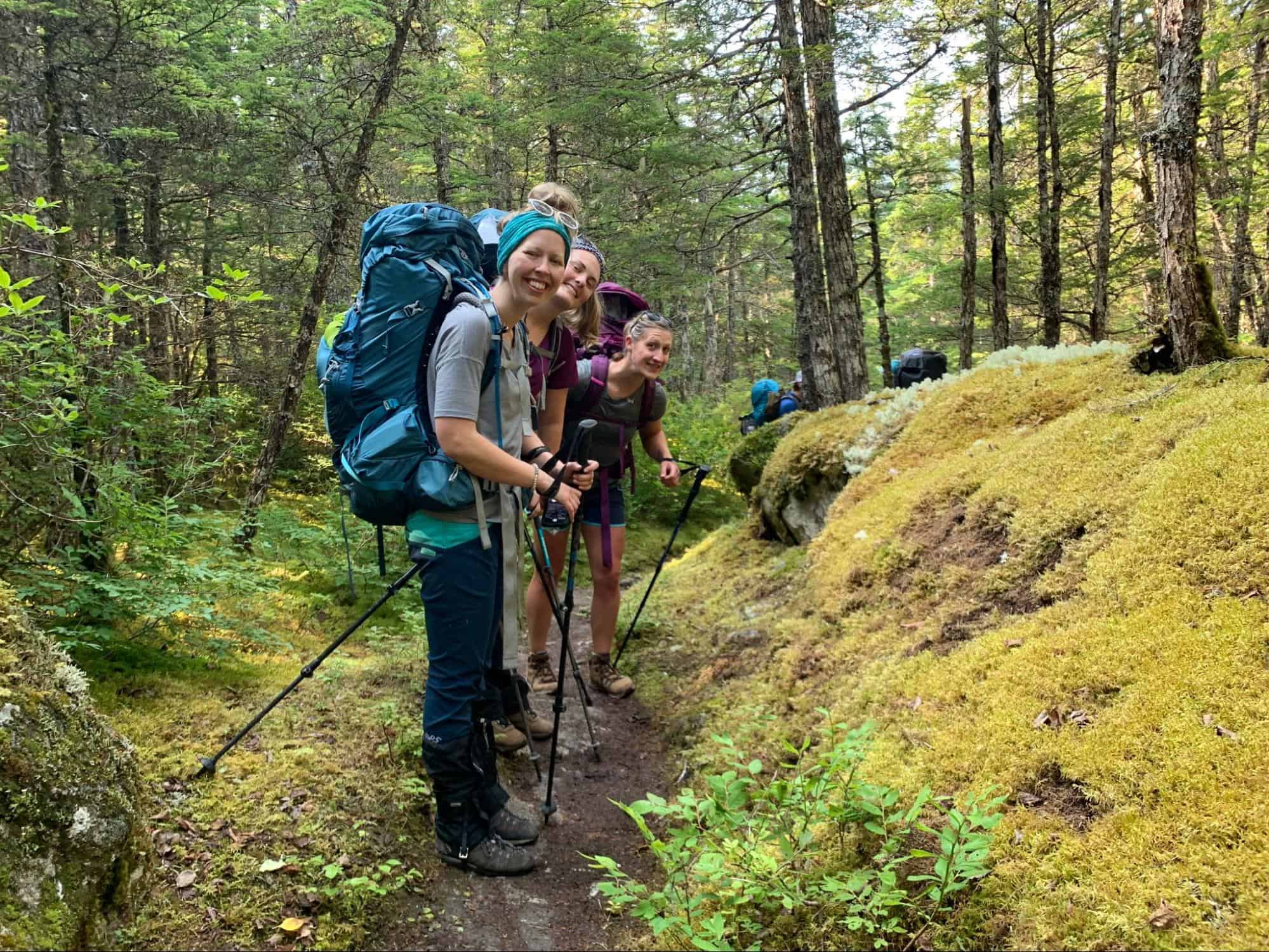
Jordi and other Adventure Team members
On that topic, what is the best way for people to contact you if they would like to talk more about what you have shared?
You can email me at jordi.cumber@gmail.com or message me on Instagram @182jordi!

